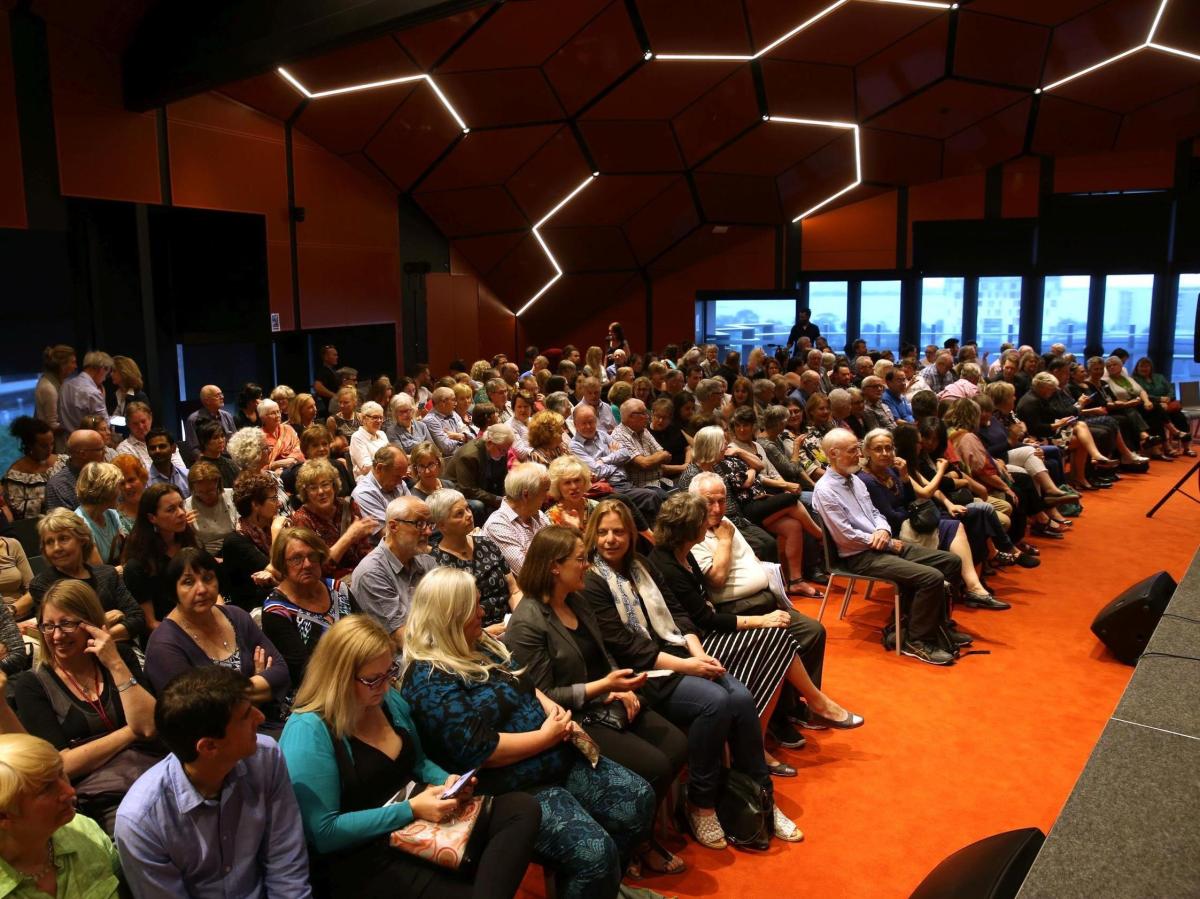The festival audience at Geelong Library’s The Dome. Image supplied.
As post-truth politics clouds contemporary discourse it’s becoming increasingly difficult to discern the truth.
Fortuitously, Australia’s great contemporary writers and thinkers, such as former Human Rights Commissioner Gillian Triggs and Kon Karapanagiotidis, CEO and founder of the Asylum Seeker Resource Centre, will “get real” on topics of social concern at Word for Word Festival over the weekend of 16-18 November.
Held in the Geelong Library and Heritage Centre and proudly supported by Deakin University and the City of Greater Geelong, Word for Word Festival is Australia’s only national literary festival dedicated to non-fiction writing and ideas.
The program boasts 76 writers across 45 sessions of workshops, forums, panel discussions and the highly anticipated keynote addresses.
This year’s opening ceremony, which has already sold out, will feature one of the nation’s most respected voices, Helen Garner, in conversation.
‘What we have found in the past is that the sessions that sell out first have really engaged audiences,’ Maryanne Vagg, Word for Word Festival Director told ArtsHub.
‘It’s about really looking at things, and examining things, like the refugee crisis in Australia – these are subjects that don’t really get an airing in the public.’

Helen Garner, Gillian Triggs, Kon Karapanagiotidis and Clementine Ford will appear at this year’s Word for Word Festival. Supplied.
This year’s festival will not shy away from controversial topics said Vagg, in the hope of provoking larger conversation that will ripple through into mainstream culture.
‘One of the beautiful things about holding it in a library space is that everybody is made welcome in a library – we have respectful conversations and discussions where we can debate some of these controversial topics and people feel safe.’
In our unstable times, when global politics and cultural shifts are changing rapidly, ‘people are really hungry for information – information that is authentic; information they can rely on that has been researched,’ said Vagg.
‘This year the provocation “Get Real” works because it’s reflective of a pretty hard-hitting program.’
Vagg encouraged the audience to ask difficult questions: ‘By talking about these very key issues with experts, with people who have the knowledge, it allows people a chance to exchange and explore divergent topics and ideas – and feel welcome to do so.
‘My favourite part of the event is when people stand in the library and essentially turn to the stranger next to them and start to have a conversation.’
Festival Highlights
Clementine Ford, Boys Will Be Boys, Saturday 17 November
Feminist writer and commentator Clementine Ford will tackle gender roles, toxic masculinity and the patriarchy in conversation with Camilla Nelson.
The Great Debate, The Novel is Dead: Long Live the Novel! Saturday 17 November
Are novels “alive” in this technological world? Join Team Affirmative: Robert Gott, Vikki Petraitis and Mikey Robins as they battle it out with Team Negative: David Astle, Sean Dooley and Marg Linley on whether the novel is not just dying, but already dead.
‘To lighten the program up we have our wonderful debate on the Saturday night,’ Vagg said. ‘I’m sure what will come out in that debate is that line between fiction and non-fiction – even when you’re writing memoir – it’s through your own lens.’
Chloe Hooper, The Arsonist: a Mind on Fire, Sunday 18 November
The Black Saturday fires shocked and shattered a nation. Chloe Hooper in conversation with Lisa Waller will discuss her investigation into the mind of the man who deliberately lit the fires that consumed over a million acres of Australian land.
Rachael Brown and Maryrose Cuskelly, Cold Hearts, Sunday 18 November
Maryrose Cuskelly and Walkley Award-winning journalist Rachael Brown will discuss Australia’s fascination with contemporary true crime.
‘We have Rachael Brown coming to speak about the podcast Trace, but then also a little bit about what prompted her to write the book, and how do you morally write about true crime?
‘It’s very, very fraught. You have the victims of the crime, you have the perpetrators – it’s a sensitive area,’ said Vagg.
To secure your seat at Word for Word Festival visit: wordforwordfestival.com.au





